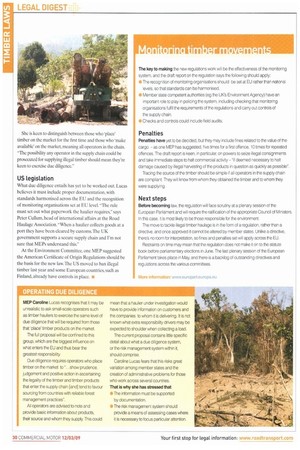1.411 • 11 110^ 11 'Yk'11'1
Page 30

If you've noticed an error in this article please click here to report it so we can fix it.
The key to making the new regulations work wifi be the effectiveness of the monitoring system, and the draft report on the regulation says the following should apply:
• The recognition of monitoring organisations should be set at EU rather than national levels, so that standards can be harmonised.
• Member state competent authorities (eg the UK's Environment Agency) have an important role to play in policing the system, including checking that monitoring organisations fulfil the requirements of the regulations and carry out controls of the supply chain.
• Checks and controls could include field audits.
Penatties
Penalties have yet to be decided, but they may include fines related to the value of the cargo as one MEP has suggested, five times for a first offence, 10 times for repeated offences. The draft report is keen, in particular, on powers to seize Illegal consignments and take immediate steps to hat commercial activity "if deemed necessary to halt damage caused by illegal harvesting of the products in question as quickly as possible".
Tracing the source of the timber should be simple if all operators in the supply chain are compliant. They will know from whom they obtained the timber and to whom they were supplying.
Next steps
Before becoming law, the regulation will face scrutiny at a plenary session of the European Parliament and will require the ratification of the appropriate Council of Ministers. In this case, it is most likely to be those responsible for the environment.
The move to tackle illegal timber haulage is in the form of a regulation, rather than a directive, and once approved it cannot be altered by member states. Unlike a directive, there's no room for interpretation, so fines and penalties set will apply across the EU.
Restraints on time may mean that the regulation does not make it on to the statute book before parliamentary elections in June. The last plenary session of the European Parliament takes place in May, and there is a backlog of outstanding directives and regulations across the various committees.
More information: www.europart.europa.eu




















































































































































